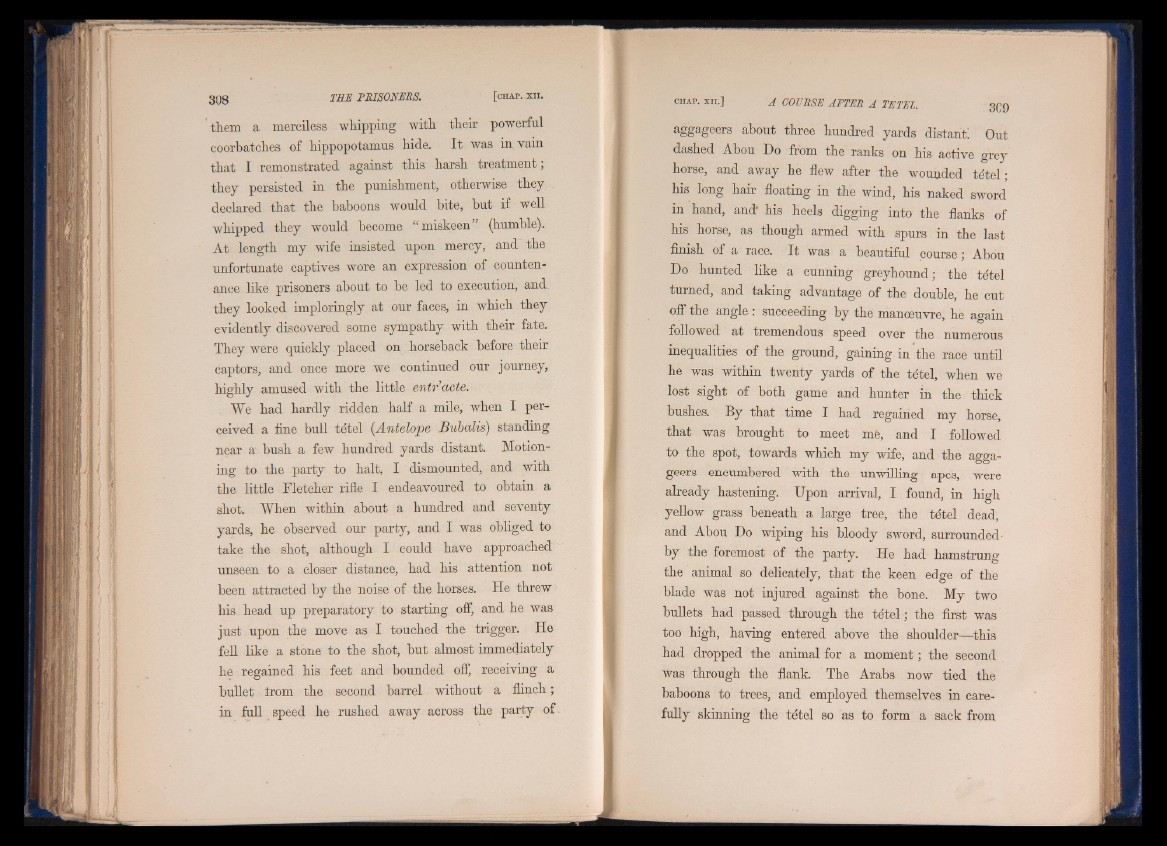
them a merciless whipping with their powerful
coorbatches of hippopotamus hide. It was in vain
that I remonstrated against this harsh treatment;
they persisted in the punishment, otherwise they
declared that the baboons would bite, but if well
whipped they would become “miskeen” (humble).
At length my wife insisted upon mercy, and the
unfortunate captives wore an expression of countenance
like prisoners about to be led to execution, and
they looked imploringly at our faces, in which they
evidently discovered some sympathy with their fate.
They were quickly placed on horseback before their
captors, and once more we continued our journey,
highly amused with the little entr’acte,.
We had hardly ridden half a mile, when I perceived
a fine bull tetel (Antelojpe Bubalis) standing
near a bush a few hundred yards distant. Motioning
to the party to halt, I dismounted, and with
the little Fletcher rifle I endeavoured to obtain a
shot. When within about a hundred and seventy
yards, he observed our party, and I was obliged to
take the shot, although I could have approached
unseen to a closer distance, had his attention not
been attracted by the noise of the horses. He threw
his head up preparatory to starting off, and he was
just upon the move as I touched the trigger. He
fell like a stone to the shot, but almost immediately
he regained his feet and bounded off, receiving a
bullet irom the second barrel without a flinch;
in full speed he rushed away across the party of
aggageers about three hundred yards distant: Out
dashed Abou Do from the ranks on his active grey
horse, and away he flew after the wounded tétel;
his long hair floating in the wind, his naked sword
in hand, and' his heels digging into the flanks of
his horse, as though armed with spurs in the last
finish of a race. It was a beautiful course ; Abou
Do hunted like a cunning greyhound; the tétel
turned, and taking advantage of the double, he cut
off the angle : succeeding by the manoeuvre, he again
followed at tremendous speed over the numerous
inequalities of the ground, gaining in the race until
he was within twenty yards of the tétel, when we
lost sight of both game and hunter in the thick
bushes. By that time I had regained my horse,
that was brought to meet me, and I followed
to the spot, towards which my wife, and the aggageers
encumbered with the unwilling apes, were
already hastening. Upon arrival, I found, in high
yellow grass beneath a large tree, the tétel dead,
and Abou Do wiping his bloody sword, surrounded-
by the foremost of the party. He had hamstrung
the animal so delicately, that the keen edge of the
blade was not injured against the bone. My two
bullets had passed through the tétel ; the first was
too high, having entered above the shoulder—this
had dropped the animal for a moment ; the second
was through the flank. The Arabs now tied the
baboons to trees, and employed themselves in carefully
skinning the tétel so as to form a sack from